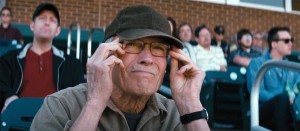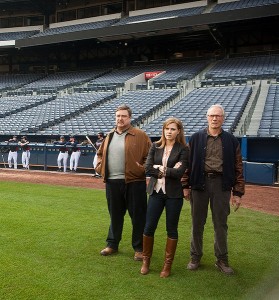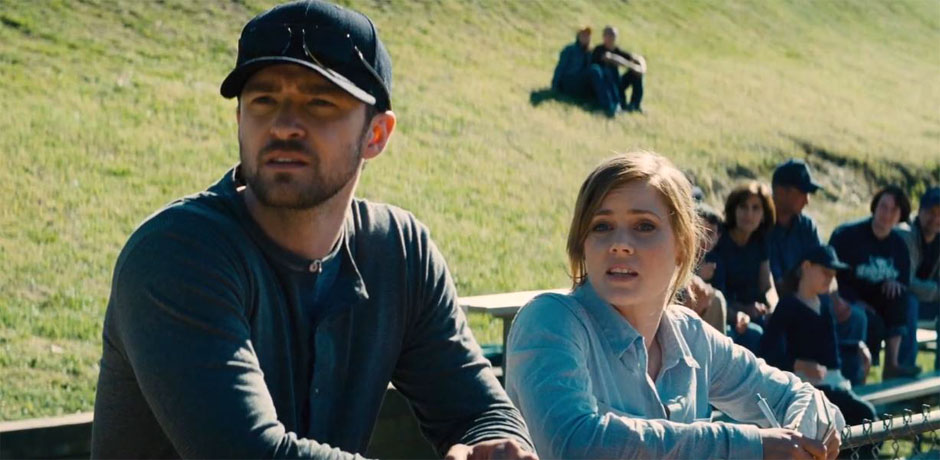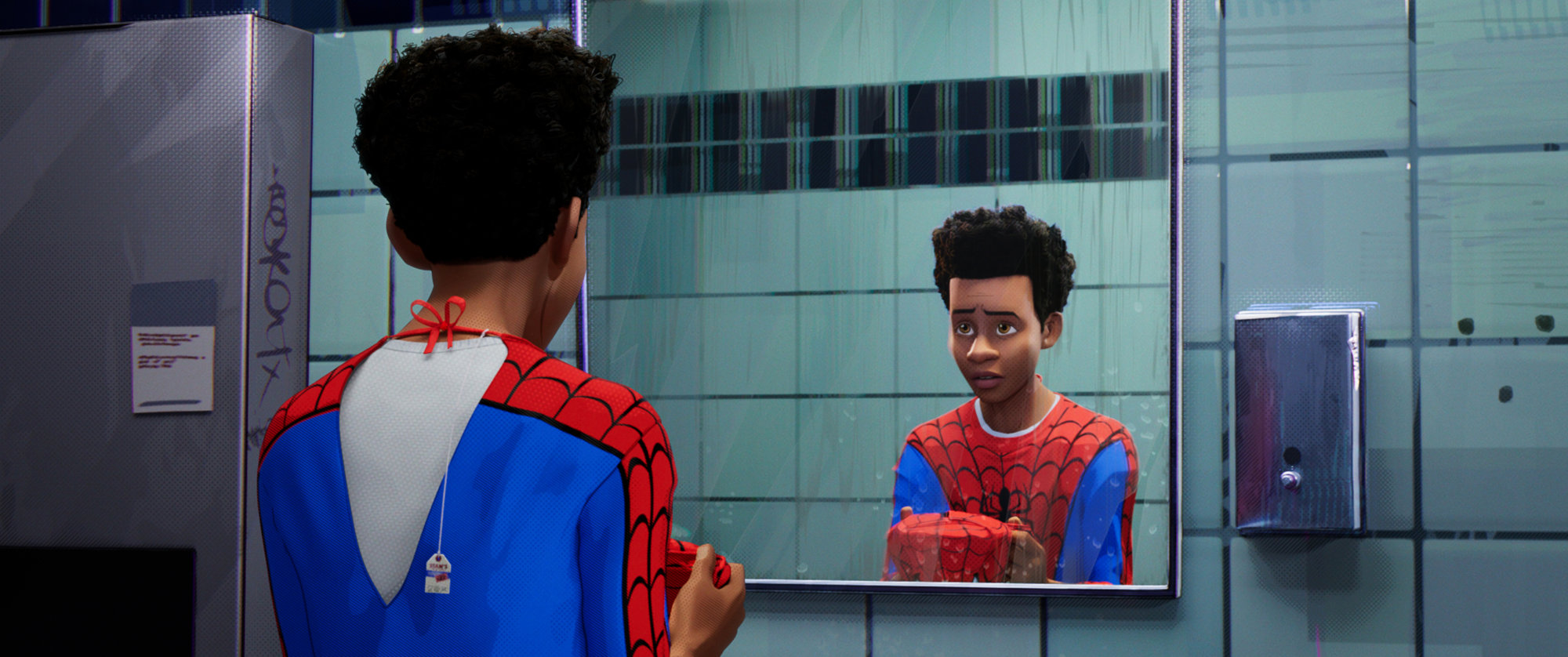I’m trying with great difficulty not to be offended by Trouble with the Curve; it was perfectly natural that someone try to refute Moneyball; conservative folks are surprisingly knee-jerk when presented with overwhelming evidence they’re wrong. But this is just embarrassing. You’ve contested a film based on fact, actual fact, representing a clear change in the way we think about baseball with a disgustingly orchestrated fictional account. By all means, keep thinking like this — it’s the only way my Oakland A’s can compete with the lowest payroll in the game.
Gus (Clint Eastwood) is a legendary Atlanta Braves baseball scout low on patience and vision. He’s become the Pinball Wizard of scouting; take away his hearing, too, and he’d scout by sense of smell. Gus doesn’t jive with the new age and often it doesn’t jive back. Given the impressive record of the ghost of Gus past, however, the Braves are willing to ship him out on one last assignment – go check out high school slugger Bo Gentry (Joe Massingill), the potential #1 pick of the amateur draft just days before the actual event. Joining him on this quest is bucking-for-partner, workaholic, semi-estranged daughter Mickey (Amy Adams). It’s magic, folks — one trumped-up plot point and we can play: buddy pic, roadtrip pic, polar-opposites pic, father-child pic, generation  gap pic, gender gap pic, heck … take your pick.
gap pic, gender gap pic, heck … take your pick.
It’s worth note that, historically speaking, baseball scout is a profession with almost zero accountability. There are two major reasons for this: 1) it is largely assumed that people who “know the game” make good decisions based on what they know. We don’t lack for evidence to the contrary. The second and more important reason is that until the computer age, almost all draft picks, touted or otherwise, were considered crap shoots. The reason for the latter is obvious – baseball players take years to develop and baseball scouting is hardly an exact science; it depends a great deal on anecdotal evidence, which is worth exactly squat in most cases. Imagine for a minute that any individual baseball talent is represented by a burlap bag full of marbles. A scout can reach into a given bag, pick out a marble or two and tell you its composition, smoothness, whether it’s stripey or polka-dotty, etc. Ask the scout to tell you how many marbles are in the bag, and the best he can do is estimate. Yet the amount of marbles represents the best answer to how good the player is.
Every argument in Trouble with the Curve suggests empirical, anecdotal evidence is more important than accumulated, mathematical evidence. Arguments like the following reign supreme: a computer can’t tell you if a player can hit a cut-off man or rebound from a bad night. And thank God it can’t, because I’d hate to base a #1 selection on talents that can be taught.
When Braves head of scouting Pete (John Goodman) comments on an overturned chair in Gus’ house, Gus responds, “don’t you know fang shmay [sic]?” Oh. Yeah, funny. Do you see the unbelievable hypocrisy here? Trouble with the Curve happily disposes of information learned in the modern age, discarding it as useless, or treating it as a joke, and yet in the same breath insists that traditional, outdated methods of information gathering must not be ignored.
And let’s be not silly here – this is the 21st century; so many Trouble moments are troubled:
[unordered_list style=”green-dot”]
- There are no agents in this movie. Within days, Bo is going to sign a contract for millions of dollars and there are no agents in sight. Think about that.
- If the Braves care about how Gus does his job, why insist his daughter be with him? Why doesn’t Pete himself go on the trip with Gus?
- There is no video footage of Bo. Seriously.
- Bo Gentry looks like he pops up every time he makes contact.
- Both the team with the #1 pick and the team with the #2 pick in the draft send exactly one scout to Bo’s games. Presumably, neither has seen him in person. The #1 pick team, in fact, sends an amateur scout.
- Bo’s games are sparsely attended. This is ridiculous from any vantage point you care to name.
- Unlike basketball and football, it’s impossible to tell if a baseball pick is a bust until at least two years have elapsed. Declaring anything conclusively by the end of Trouble speaks only to how little research was done.
[/unordered_list]
Baseball is a multi-billion dollar industry; any kid being considered among the top-100 prospects would have been scouted to death months in advance of the draft. Every single team would have extensive video footage of every single blue chipper, including the ones they have no interest in; every team would know the footage back to front long before draft day. The average fan is far savvier than ever before. Games involving potential future stars aren’t attended like little league games; people and scouts come out in droves when a possible #1 is involved. Assuming a #1 pick is still scoutable a week before draft day is a monumental joke. Assuming that a team would leave said decision, sight unseen, in the hands of just one or two guys is a bigger  joke. There is nothing you “discover” about a #1 pick after you draft him. By the time his name is called on the podium, every team in the bigs knows what he feeds his cat and whether his grandmother puts out on the first date.
joke. There is nothing you “discover” about a #1 pick after you draft him. By the time his name is called on the podium, every team in the bigs knows what he feeds his cat and whether his grandmother puts out on the first date.
Why is this important? Why did I go this far? Because this is an argument movie and the argument is insulting. In an effort to refute an argument based on numbers and science, you Troublemakers summoned up a uniquely contoured fictional argument invoking a world that doesn’t exist. This is worse than the Tea Party. Or maybe as bad.
As for the film, well, I foresaw the ending, step-for-step, 90 minutes ahead of schedule. Hard to enjoy a drama this color-by-number. Clint Eastwood is lovingly irascible, sure. And I like looking at Amy Adams. In fact, the highlight of Trouble for me, was an all-too-brief home run trot by Miss Adams, who, by the way, also popped up. Rival scout/love interest Justin Timberlake is a good guy, so he gets a good ending. Spoiler alert: he romances Amy, not Clint. But Matthew Lillard (Trouble‘s answer to Moneyball‘s Jonah Hill) and Joe Massingill are both douchebags, so they’ll get theirs. If it were any more cliché, Robert Redford would return in a Knights uniform for Act IV.
And if you think about it, well, that is what sport is about, right? The good guys always succeed. The self-centered douchebags always lose. Yeah, that’s what we love most about sport.
It looked extremely rocky for the Eastwood gang that day.
The rate stood at two stars with but minutes left to play.
When Timberlake failed to connect and Adams did the same,
It was time for grampa “make my day” to come and save the game.
O, somewhere in this cinescape, life is not a mess;
We cheer on The Avengers; Tyler Perry wears a dress.
Somewhere Sandra falls in love and somewhere Nic must shout,
But there is no joy in Eastwood, mighty Clinty has struck out.
Rated PG-13, 111 Minutes
D: Robert Lorenz
W: Randy Brown
Genre: Baseball as seen through the eyes of the blind
Type of person most likely to enjoy this film: GOP Conventioneers
Type of person least likely to enjoy this film: Real life baseball executives



